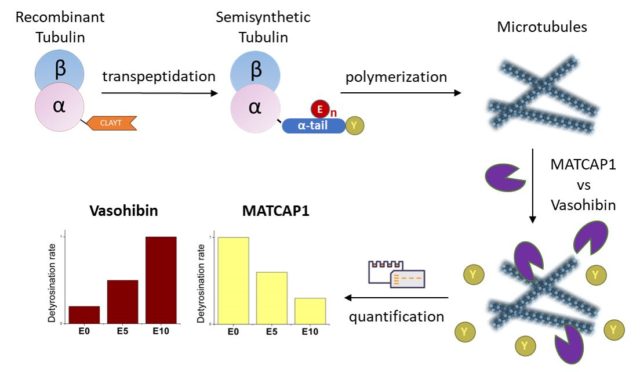Master student Andrei Zhauniarovich has been awarded the Prize for the Best Master’s Thesis 2024 in Chemical Biology, for his research project which implemented a semisynthetic approach to study the interplay between two reversible post-translational modifications of tubulin, detyrosination and polyglutamylation. His work was conducted at the laboratory of Prof. Beat Fierz, EPF Lausanne.
The prize was awarded by the Swiss Network for Interdisciplinary Education in Chemical Biology (SNE Chemical Biology) at the University of Geneva on 22 January 2024, following the oral defence by the master students of their research projects i.e. at the end of their Master in Chemical Biology programme, a course jointly organised by the University of Geneva and EPFL under the coordination of the SNE Chemical Biology.
Andrei Zhauniarovich’s research project entitled ”Exploring the Landscape of Tubulin Post-Translational Modifications: Interplay Between α-Tubulin Polyglutamyltion and Detyrosination” implemented a semisynthetic approach to study the interplay between two reversible post-translational modifications of α/β tubulin involving detyrosination and polyglutamylation.
α/β-Tubulin protein dimers polymerize into microtubules, an essential component of the cytoskeleton. Tubulin post-translational modifications involving detyrosination/retyrosination cycle is associated with the regulation of the microtubules dynamic properties and thus the functions they perform in biological systems. From previously published study, it was known that another family of enzymes, vasohibins, which have similar to recently discovered enzyme MATCAP1 catalytic activity, is differently regulated by polyglutamylation modification: tubulin detyrosination activity of vasohibins is upregulated by polyglutamylation.
Over nearly a year, Andrei studied tubulin detyrosination activity of enzyme MATCAP1 on semisynthetic microtubules with defined polyglutamylation modifications synthetically installed on their a-subunits. His research showed that tubulin polyglutamylation downregulates MATCAP1 activity. With his results, Andrei deepened the understanding of how tubulin polyglutamylation affects its detyrosination and emphasized the importance of interplay between protein post-translational modifications.
Congratulations Andrei!

Biosketch
Andrei Zhauniarovich did a Bachelor in Chemistry of Medicinal Compounds at the Belarusian State University, in the faculty of Chemistry. He was always attracted by the interdisciplinarity, its magic that allows one to plunge into the tiny world of macromolecules, to investigate how this world functions, and to create new complex systems, that expand the capacity of the nature itself. During his Master in Chemical Biology, he received both class-room based learning as well as practical coaching in laboratory environments (internships) from world-renowned scientists and their research collaborators. This multifaced instruction approach was specifically selected to train the next generation highly-qualified, multidisciplinary young scientists who will go on define the future of science.
More info

Share this article